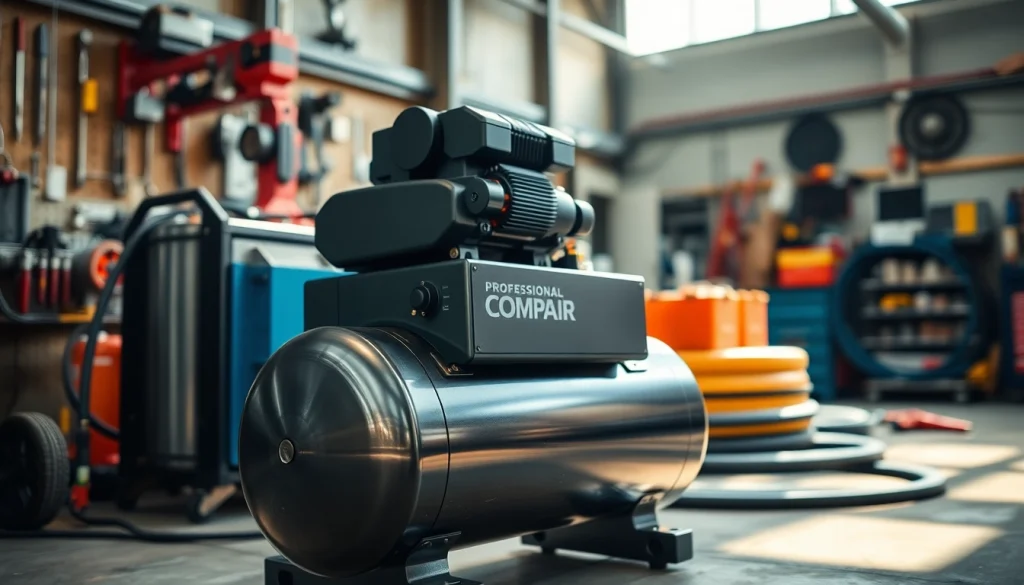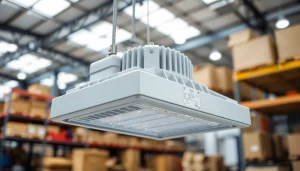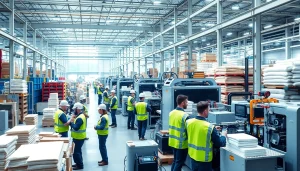Enhancing Performance and Efficiency with CompAir Compressors

Understanding the CompAir Compressor
In the world of industrial and commercial applications, the efficiency of machinery can greatly influence productivity and overall operational costs. This is particularly true when it comes to compressed air systems. Among the leading manufacturers in this niche is CompAir compressor, known for their innovation, reliability, and commitment to quality. In this article, we’ll explore the various aspects of CompAir compressors, including their features, benefits, and how to select the right unit for your needs.
What is a CompAir Compressor?
CompAir compressors are advanced machines designed to convert power into potential energy stored in compressed air. Founded on a rich history traced over two centuries, CompAir has evolved to become a significant player in the air compression market, delivering solutions for a wide range of industrial applications. The compressors are engineered to perform under demanding conditions, making them a preferred choice for many sectors including manufacturing, construction, and automotive services.
Key Features and Technologies
CompAir compressors integrate several advanced features and technologies that optimize their performance:
- Bi-Turbo Technology: Many of CompAir’s latest models utilize a unique Bi-Turbo system that enhances airflow efficiency and reduces fuel consumption.
- Energy Efficiency: Designed to minimize energy usage, these compressors often come equipped with variable speed drives that adjust motor speeds based on demand.
- Durable Construction: Built with robust materials, CompAir compressors are designed to withstand the rigors of daily use, ensuring longevity and reliability.
- Smart Control Systems: Advanced control systems allow for real-time monitoring of performance and diagnostics, facilitating easy maintenance and troubleshooting.
Applications of CompAir Compressors
CompAir compressors are versatile and can be utilized across various industries:
- Manufacturing: Used for powering pneumatic tools, material handling, and automation systems.
- Construction: Essential for applications such as air hammers and concrete mixers.
- Automotive: Used in spray painting, tire inflation, and various assembly tasks.
- Food and Beverage: Compressed air solutions are vital for processes like bottling, packaging, and food processing.
The Benefits of Using CompAir Compressors
Energy Efficiency Advantages
One of the most significant benefits of using CompAir compressors is their energy efficiency. Modern compressors from CompAir include features like variable speed drives, which can lead to substantial energy savings. By adjusting the compressor’s output to match the demand, businesses can significantly reduce energy consumption and lower operating costs.
Durability and Reliability
Durability is another core advantage. CompAir compressors are engineered to function effectively in tough environments, making them reliable assets in any operational setting. Enhanced material selection and rigorous testing standards ensure that these compressors can handle heavy workloads while maintaining efficient performance.
Cost-Effectiveness in Operations
With the dual benefits of energy efficiency and durability, CompAir compressors offer a solid return on investment (ROI). The machines are designed for longevity, which means less downtime and reduced maintenance costs over time. Organizations can expect a long service life, translating to further cost savings derived from infrequent need for replacements.
How to Choose the Right CompAir Compressor
Key Specifications to Consider
When selecting a CompAir compressor, it’s essential to consider several key specifications:
- CFM Rating: Cubic Feet per Minute (CFM) measures the compressor’s air delivery rate. Ensure that the CFM aligns with your equipment’s requirements.
- Pressure Rating: The compressor must meet the pressure requirements of your applications, usually measured in PSI (Pounds per Square Inch).
- Type of Compressor: Decide between rotary screw compressors, reciprocating compressors, and portable models based on your operational needs.
- Power Source: Consider whether electric, diesel, or gasoline models would be more appropriate for your location and type of usage.
Understanding Your Specific Needs
Understanding the specific needs of your operation is crucial in selecting the right model. Factors such as the nature of tasks (continuous vs. intermittent), available space for installation, and required mobility should guide your selection process.
Comparison with Other Brands
When comparing CompAir with other compressor manufacturers, it’s important to look beyond initial cost. Consider factors such as warranty coverage, service availability, and overall brand reputation. For example, while some brands might offer lower initial pricing, the potential hidden costs in maintenance and inefficiencies may make CompAir a more cost-effective choice in the long run.
Maintenance Tips for Your CompAir Compressor
Routine Maintenance Practices
To ensure optimal performance and longevity of your CompAir compressor, regular maintenance is key. Essential practices include:
- Checking and changing the oil as per the manufacturer’s recommendations.
- Regularly inspecting and replacing filters to maintain air quality.
- Monitoring vibration and temperature to detect any potential issues early.
- Conducting regular system audits to ensure all components function correctly.
Common Issues and Troubleshooting
Understanding common issues can significantly reduce downtime. Some frequent problems include:
- Air Leaks: Regularly check hoses and fittings for leaks, which can impact efficiency.
- Pressure Drops: Monitor system pressure and investigate any drops to determine if the compressor is functioning correctly.
- Noisy Operation: Excessive noise can be indicative of wear or loose components that need attention.
When to Seek Professional Support
While many maintenance tasks can be handled internally, it’s important to recognize when to request professional help. If performance issues persist despite routine maintenance, or if you encounter complex repairs, seeking the expertise of a certified CompAir technician can prevent further complications and ensure your compressor operates at peak efficiency.
Maximizing the Lifespan of Your CompAir Compressor
Optimizing Usage and Settings
Utilizing your compressor effectively can play a crucial role in extending its lifespan. Familiarize yourself with the settings and adjust operational parameters to match your workload. Overworking the compressor beyond its capacity can lead to premature wear and costly repairs.
Scheduled Maintenance Inspections
Implement a scheduled maintenance plan, conducting inspections at regular intervals to foresee and address any potential issues before they escalate. Using a maintenance log can help track service dates, tasks performed, and any irregularities noticed.
Using Quality Replacement Parts
When replacements are necessary, always choose OEM (Original Equipment Manufacturer) parts to ensure compatibility and reliability. Using inferior parts can lead to compounded issues, negatively impacting the machine’s performance and longevity.







